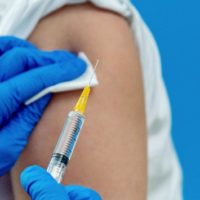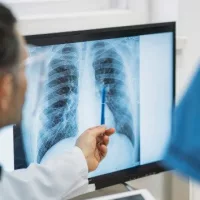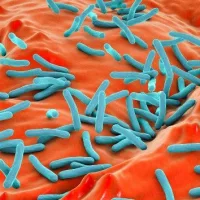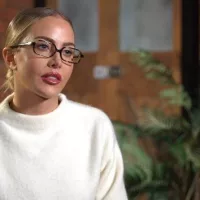
(ATLANTA) — Amid more than 300 confirmed cases of heart inflammation in teens and young adults who have received COVID-19 vaccines, the nation’s leading health experts say the Pfizer and Moderna vaccines remain safe for use.
Dr. Rochelle Walensky, director of the Centers for Disease Control and Prevention (CDC), said on Good Morning America Thursday the benefits of the vaccine for young people “overwhelmingly outweigh the risk,” echoing the findings of researchers at a CDC advisory committee meeting this week on vaccines.
Out of more than 26 million doses given to young people, the CDC has so far confirmed 323 cases of heart inflammation, called myocarditis or pericarditis, and is still monitoring more cases. Of the confirmed cases, the vast majority were temporary and resolved with monitoring and treatment.
“To put this in perspective, if we have a group of 12 to 17-year-olds who we’re working to vaccinate over the next four months and can vaccinate 1 million of them, which would be great strides, over the next four months we could expect 30 to 40 of these mild self-limited cases of myocarditis,” Walensky said on GMA. “And for that, if we were to vaccinate all 1 million we would avert 8,000 cases of COVID, 200 hospitalizations, 50 ICU stays and one death.”
The rare instances of heart inflammation occurred about 12.6 times out of every million second dose administered and were mostly among younger males about a week after the second dose of the Pfizer or Moderna vaccines, according to researchers at the CDC advisory committee.
Regulators at the Food and Drug Administration (FDA) say they are preparing a warning to go along with the Pfizer and Moderna vaccines to make young people aware of the very rare risk.
Pfizer’s COVID-19 vaccine was authorized for use in children ages 12 to 15 last month by the U.S. Food and Drug Administration (FDA).
The two other COVID-19 vaccines available in the United States, Moderna and Johnson & Johnson, are currently available for anyone 18 years and older in the U.S.
Moderna filed for emergency use authorization with the FDA for its vaccine in adolescents on June 10.
Here is what parents may want to know about the COVID-19 vaccines and kids to help them make decisions.
1. What is the science behind the COVID-19 vaccine?
Both the Pfizer and Moderna vaccines use mRNA technology, which does not enter the nucleus of the cells and doesn’t alter human DNA. Instead, it sends a genetic “instruction manual” that prompts cells to create proteins that look like the outside of the virus — a way for the body to learn and develop defenses against future infection.
The Johnson & Johnson vaccine uses an inactivated adenovirus vector, Ad26, that cannot replicate. The Ad26 vector carries a piece of DNA with instructions to make the SARS-CoV-2 spike protein that triggers an immune response.
This same type of vaccine has been authorized for Ebola, and has been studied extensively for other illnesses — and for how it affects women who are pregnant or breastfeeding.
Neither of these vaccine platforms can cause COVID-19.
2. What is the status of vaccine eligibility for kids?
Pfizer announced earlier this month it is moving forward with the final phase of clinical trials for its COVID-19 vaccine, meaning kids as young as five are one step closer to being able to be vaccinated.
Pfizer’s new study of more than 4,500 children in four countries, including the United States, will see children ages 11 and under receive a smaller dose of the COVID-19 vaccine than adults.
Children in the trial will receive 10 micrograms of each vaccine dose, compared to the 30 micrograms in each dose that people ages 12 and older receive.
In the coming weeks, Pfizer said it plans to launch a Phase 2/3 trial in children ages 2 to 4 years and then children ages six months to 2 years with an even smaller dose of the vaccine.
“Children younger than 12 make up a significant portion of the total global population and can develop COVID-19 disease, and also can spread the virus to others,” Bill Gruber, M.D., senior vice president of clinical research and development at Pfizer, said in a statement. “If successful, we believe vaccinating children will help further protect our communities and contribute to the evolving herd immunity.”
Pfizer has said it will likely seek an emergency use authorization for its vaccine for children ages 2 to 11 in September. Its COVID-19 vaccine was authorized for use in children ages 12 to 15 last month by the U.S. Food and Drug Administration (FDA).
The two other COVID-19 vaccines available in the United States, Moderna and Johnson & Johnson, are currently available for anyone 18 years and older in the U.S.
Moderna filed for emergency use authorization with the FDA for its vaccine in adolescents on June 10.
3. Why do kids need to be vaccinated against COVID-19?
While have not been as many deaths from COVID-19 among children as adults, particularly adults in high-risk categories, kids can still get the virus and just as importantly, they can transmit the virus to adults.
The American Academy of Pediatrics reported this week that children now make up 22.4% of all new weekly cases, and over 3.7 million children have been diagnosed during the pandemic.
“There are really two big reasons why kids need to get the vaccine,” explained Dr. Jennifer Ashton, ABC News chief medical correspondent.
“One of them is that it is possible that they could be infected and then unknowingly pass COVID-19 to someone with a serious or underlying, pre-existing medical condition,” she said. “And also, though it’s very uncommon and unlikely, it is still possible that children infected with COVID-19 could become seriously ill or worse. We have seen that.”
“It’s important to think in ripple effects, outside the box,” Ashton added. “It’s not just your home environment that you need to worry about.”
4. Will kids experience the same vaccine side effects as adults?
Adolescents experienced a similar range of side effects as seen in older teens and young adults — generally seen as cold-like symptoms in the two to three days after the second dose — and had an “excellent safety profile,” Peter Marks, director of the FDA’s Center for Biologics Evaluation and Research, said at a press briefing announcing Pfizer’s authorization.
“Based on all this available information, the FDA determined the Pfizer-BioNTech vaccine has met all of the criteria required to amend the EUA, which concluded that the known and potential benefits of this vaccine in individuals 12 years of age and older outweigh the vaccines known and potential risks,” Marks said.
Marks encouraged parents who were hesitant to vaccinate their children to speak with their pediatricians, urging confidence in the trial and data.
Moderna said its COVID-19 study with teens ages 12 to under 18 identified no “significant safety concerns.” The most common side effects from the vaccine were injection site pain, headache, fatigue, muscle pain and chills, according to the company.
The FDA will scrutinize Moderna’s clinical data before authorizing the use in anyone under 18.
5. How effective are the vaccines in children?
Pfizer announced in late March that its clinical trials showed the vaccine was safe and 100% effective in children ages 12-15, similar to the 95% efficacy among adult clinical trial participants.
Marks confirmed on May 10 that after a trial with over 2,000 children, Pfizer found no cases of infection among the children who had been given the vaccine and 16 cases of infection among the children who received a placebo.
No cases of COVID occurred in the 1,005 adolescents that received the vaccine, while there were 16 cases of COVID among the 978 kids who received the placebo, “thus indicating the vaccine was 100% effective in preventing COVID-19 In this trial,” said Marks.
Moderna’s COVID-19 vaccine is 100% effective in children ages 12 to under 18, the company said last month, in announcing results of their latest clinical trials.
In addition to its efficacy, the vaccine showed “no significant safety concerns” in the trial of more than 3,700 adolescent participants, according to Moderna.
6. Will kids get the same dose of the vaccines as adults?
The FDA has authorized the same dosing for 12- to 15-year-olds as adults with the Pfizer two-dose vaccine.
Pfizer is currently testing smaller doses of the vaccine in children ages 11 and under.
7. What will fully vaccinated kids be able to do?
Children who are fully vaccinated will be able to follow the updated guidance for vaccinated people from the CDC.
That means not wearing a mask while outdoors, except in crowds, and not having to quarantine after known or suspected exposure to COVID-19, according to the CDC.
Kids who are fully vaccinated may also attend small outdoor gatherings with fully vaccinated family, friends, or those who are unvaccinated, and dine at outdoor restaurants with friends from multiple households, according to the CDC.
Being fully vaccinated — a milestone achieved two weeks after a person’s final vaccine shot — will also make it easier for children to travel internationally and gain entry into concerts or sporting events.
8. Could COVID-19 vaccines impact puberty, menstruation?
There is currently no clinical evidence to suggest the vaccines can have long-term effects on puberty or fertility, according to Ashton, a practicing, board-certified OBGYN.
Ashton noted that while there has been anecdotal discussion of the emotional event of finally receiving the vaccine temporarily impacting menstruation for adult women, the idea of the cause being from the vaccine itself “defies science and biology.”
It is really important to understand basic biology here,” Ashton said. “Women can have changes in their menstrual cycle and also have gotten the vaccine, that does not mean that one caused the other.”
“Right now there is no puberty concern. There is no fertility concern,” she added.
9. Will the Johnson & Johnson COVID-19 vaccine be available for kids?
Johnson & Johnson announced in April that it had begun vaccinating a “small number of adolescents aged 16-17 years” in a Phase 2a clinical trial.
As of April, the trial was enrolling participants only in Spain and the United Kingdom, with plans to expand enrollment to the U.S., the Netherlands and Canada, followed by Brazil and Argentina.
10. Where can children access COVID-19 vaccines?
As with the distribution of vaccines to adults, the process of distributing COVID-19 vaccines to children differs by state.
The rollout is a “multi-pronged approach,” including vaccination sites already in operation, major retail pharmacies, mobile health clinics, schools and family doctors, according to the CDC advisory panel.
CVS and Walgreens began giving the Pfizer vaccine to the newly eligible group on May 13, either with scheduled appointments online, through their apps or over the phone.
The Biden administration announced plans to ship Pfizer doses directly to pediatricians’ offices, which they have stressed will be an important partner in this effort, encouraging governors to help enroll family practitioners and pediatricians “as quickly as possible.”
If a child gets the vaccine at a mass vaccination site or pharmacy, their parent should alert the child’s pediatrician’s office so they can keep the immunization record up to date.
Both the CDC panel and the American Academy of Pediatrics (AAP) have said it is okay for children to get other vaccines at the same time as the COVID-19 vaccine.
Later this summer, the U.S. Department of Health and Human Services (HHS) will launch “back to school” partnerships to support vaccinations as part of annual physicals and sports physicals.
11. What are health groups saying about COVID-19 vaccines and kids?
The AAP has recommended that “all eligible children, teens, family and household members be vaccinated as soon as possible.”
“This is truly an exciting development that allows us to protect a large population of children and help them regain their lives after a really rough year,” AAP President Lee Savio Beers, MD, said in a May 12 statement. “As a pediatrician and a parent, I have looked forward to getting my own children and patients vaccinated, and I am thrilled that those ages 12 and older can now be protected. The data continue to show that this vaccine is safe and effective. I urge all parents to call their pediatrician to learn more about how to get their children and teens vaccinated.”
“We’ve seen the harm done to children’s mental and emotional health as they’ve missed out on so many experiences during the pandemic,” Beers said. “Vaccinating children will protect them and allow them to fully engage in all of the activities—school, sports, socializing with friends and family— that are so important to their health and development.”
12. Will COVID-19 vaccines be required by schools?
It will be up to each state’s government to decide whether a COVID-19 vaccine is required for school entry. Many colleges and universities in the U.S. have announced they will require students to be vaccinated from COVID-19.
Copyright © 2021, ABC Audio. All rights reserved.















